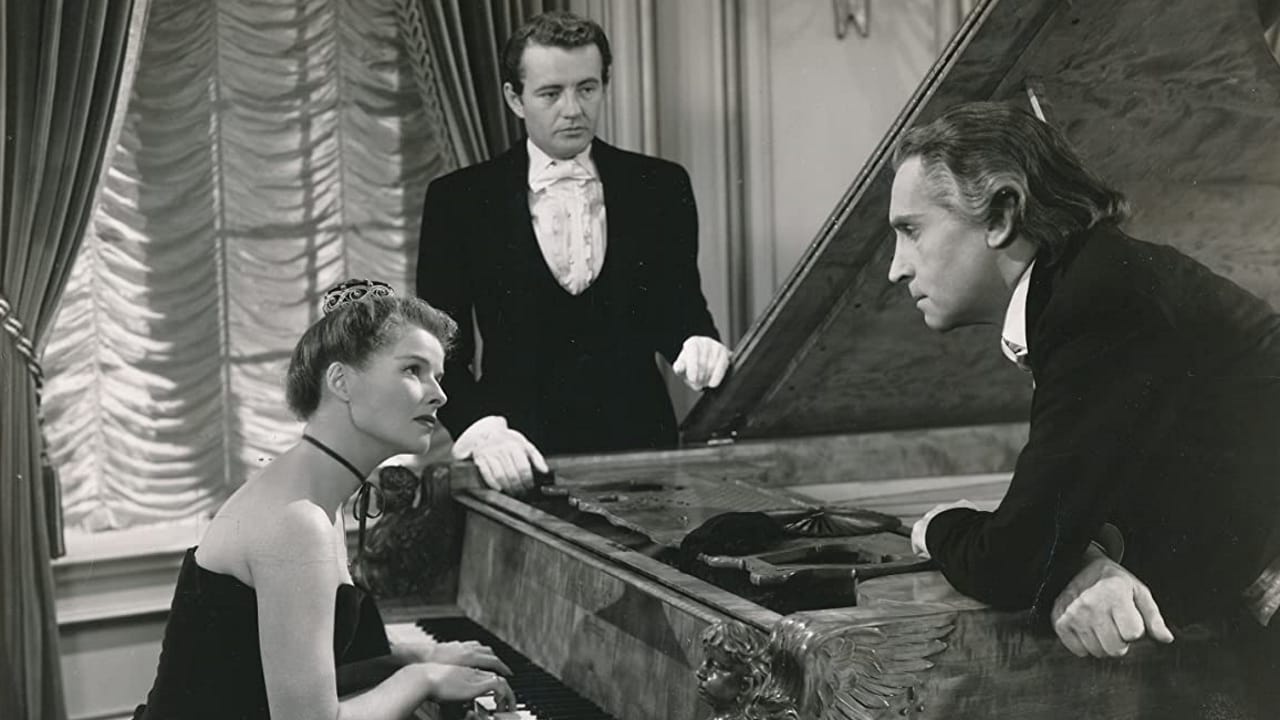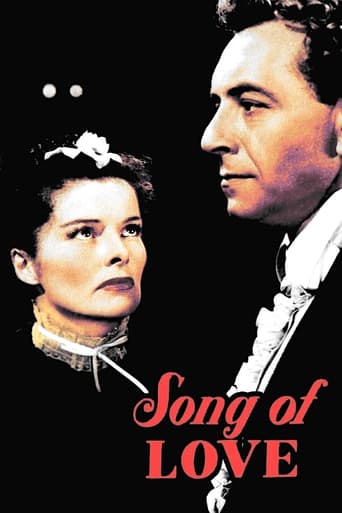

Expected more
... View MoreDid you people see the same film I saw?
... View MoreI think this is a new genre that they're all sort of working their way through it and haven't got all the kinks worked out yet but it's a genre that works for me.
... View MoreLet me be very fair here, this is not the best movie in my opinion. But, this movie is fun, it has purpose and is very enjoyable to watch.
... View MoreIn this biopic of Robert Schumann, Paul Henreid plays the struggling pianist and Katharine Hepburn plays his wife, also a pianist. While Paul felt fine about using a hand double during the musical scenes, Kate trained so that she would be believable as a piano player. Not only do you see her playing during the scenes, but you actually hear her, too! Usually, music is dubbed over, but Kate was so flawless in her playing that director Clarence Brown opted to let audiences hear her music. So, if you want to see Katharine Hepburn showing an enormous amount of musical talent, this is the movie for you! Robert Walker costars as Johannes Brahms, as well as Henry Daniell as Franz Liszt. It's an interesting story to see the three famous musicians together, but the main focus of the plot is the Schumanns. Kate puts her career on hold to give her full support to Paul as he pursues his musical dreams, but will the pressure prove to be too much for him? You'll have to watch the film, or know your history, to find out.My favorite scene in the film is during one of Katharine Hepburn's concerts. There she is, in a beautiful ball gown, playing a slow concerto to hundreds of people in a theater, when a nurse shows herself in the wings and tries to get Kate's attention. She holds up Kate's newborn baby, indicating that the child is hungry and needs food from Mama. Kate immediately speeds up the piano concerto, to the audience's confusion and entertainment, so that she can finish the piece as quickly as possible and attend to her baby. It's hilarious and adorable. If you like musical movies, or if you found that scene too cute to resist, go ahead and rent Song of Love. It probably won't be your all-time favorite Katharine Hepburn movie, but it's pretty good.
... View MoreI don't quite understand how people can see this movie as a serious biopic. It has all the typical ingredients and feeling of a romantic/musical MGM movie from the '40's. Not much in it that makes this movie distinct itself.Yes, it's really one of those movies of when you've seen one of them. you've seen them all! Don't get me wrong, "Song of Love" is not bad, at least not worse than other same type of genre movies but it's also not any better. The movie is far too formulaic for that.You can say that the only real redeeming quality of the movie is its music. It features the music from composers Schumann, Liszt and Brahms (characters also appearing in the movie). It's really beautiful music to hear and it gets featured prominently in the movie.Nothing wrong with the acting in this one. Katharine Hepburn was real great. I also liked Paul Henreid, who has also appeared in another couple of good well known movies. Not every character gets ever really deepened out unfortunately. It makes the movie with its drama mostly shallow and therefor the movie also doesn't leave a very big impression.If you like these type of '40's MGM movies this is of course a perfectly good watch or you. It features all of the ingredients and way of storytelling and it also most definitely has the same typical atmosphere all over it.6/10http://bobafett1138.blogspot.com/
... View MoreThis was produced as a sincere attempt to tell the story of the relationship between composer Robert Schumann, his wife Clara, and an up-and-coming youngster, Johannes Brahms.The story is largely a fictionalized version of the true tale. According to their letters, Clara's feelings for the young Brahms were more of a motherly than a romantic nature. Brahms did indeed feel a great deal for Clara, but he knew the parameters of their relationship and accepted them. The portrayal of Robert in this film is the worst written and least accurate, probably accounting for Henreid's pallid performance. Brahms was only one of the young male talents that Robert befriended and aided, while Clara looked the other way. We now know too that Robert's illness and cause of death was most likely the ravages of syphilis. The picture skirts the issue and never really makes clear what is wrong with him.The portrayal of the resourceful and strong-willed Clara is more accurate, and Hepburn is a good casting choice, though on the surface an unlikely one, and the best part of the picture is the portrayal of the boisterous Schumann household, which she essentially heads, leaving her husband free to pursue his own interests and talents. And after Robert's death, the real Clara did indeed devote her life to preserving his legacy.This film is not a bad one, though the reverential way these three people are treated, and the stilted dialogue written for them, gets in the way. Walker looks so much like the portraits of the young Brahms, especially Brahms in his thirties, that it's uncanny.The choice of Artur Rubenstein to play all of the solo piano pieces on the soundtrack is a puzzling one, as he makes little attempt to differentiate between the styles of playing of the different characters. And Rubenstein was never a particularly strong player of Brahms and Schumann. His playing of Liszt is much better.
... View MoreI have not seen this movie since the 60's. It is never shown at Hepburn retrospectives and I suspect that is because Clara Schumann--a married woman with a lot of children--is deemed some sort of affront to the Hepburn image or feminism or both.Their social circumstances may have been very different but the Clara Schumann I have read about shared many of Kate's qualities--energy, ambition,frankness and a frantic devotion to the seriously troubled man she chose to share her life with.People who deride the film usually never saw it. Or maybe they do not like classical music but want to hide their feelings behind claims of historical inaccuracies I would like to know more about the director Clarence Brown
... View More